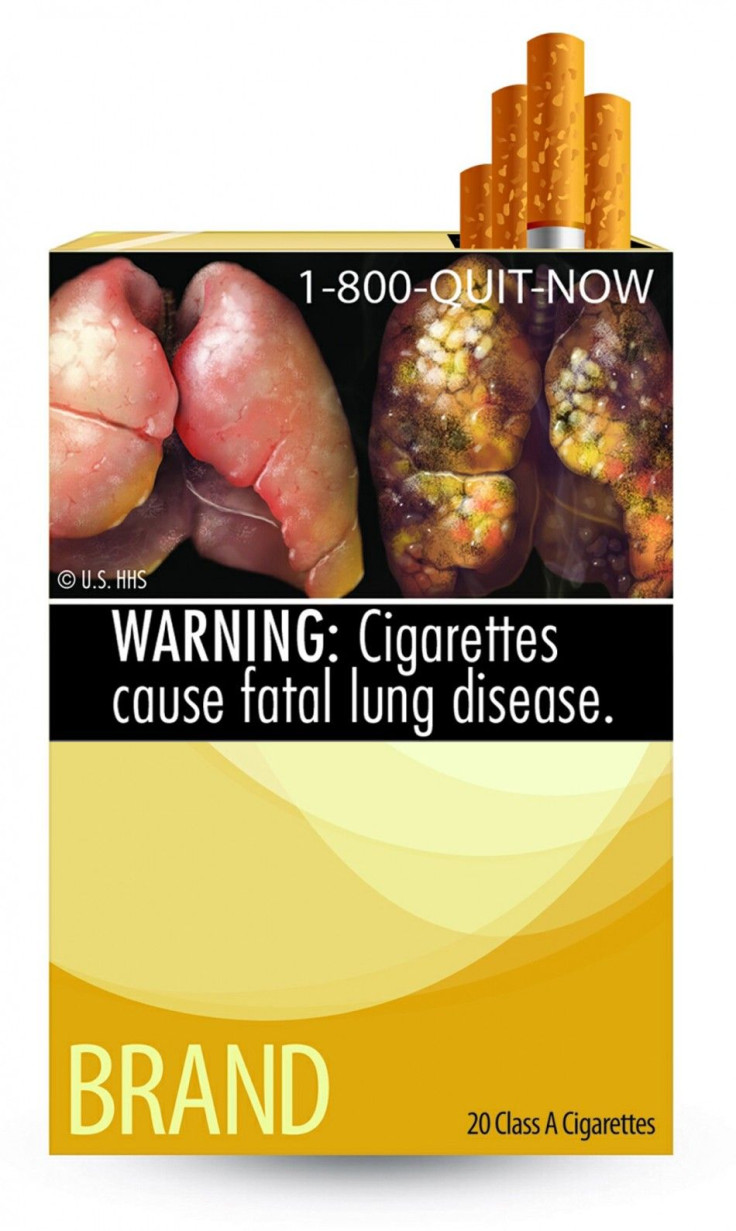U.S. Judge Blocks Graphic Cigarette Warnings

WASHINGTON (Reuters) - A federal judge blocked a U.S. rule requiring tobacco companies to display graphic images on cigarette packs, such as a man exhaling cigarette smoke through a hole in his throat.
U.S. District Judge Richard Leon sided on Monday with tobacco companies and granted a temporary injunction, saying they would likely prevail in their lawsuit challenging the requirement as unconstitutional because it compels speech in violation of the First Amendment.
The Food and Drug Administration in June released nine new warnings to go into effect in September of 2012, the first change in U.S. cigarette warning labels in 25 years. Cigarette packs already carry text warnings from the U.S. Surgeon General.
The new warnings must cover the top half of the front and back of cigarette packs and 20 percent of printed advertisements and must contain color graphics depicting the health consequences of smoking, including diseased lungs, dead bodies and rotting teeth.
Congress instructed FDA to impose the new labels as part of 2009 legislation making the agency responsible for regulating tobacco products.
The sheer size and display requirements for the graphic images are anything but narrowly tailored, Leon wrote in a 29-page opinion.
Just because Congress ordered the size and placement of the new warnings before charging the FDA with carrying out the mandate, doing so does not enable this requirement to somehow automatically pass constitutional muster, he said.
The content of the images would also not likely survive constitutional muster because the FDA did not attempt to narrowly tailor those either, the judge said.
The tobacco lawsuit is the latest effort by corporations to assert a right to free speech, a high-profile legal battle that could end up before the U.S. Supreme Court.
Reynolds American Inc's R.J. Reynolds unit, Lorillard Inc, Liggett Group LLC and Commonwealth Brands Inc, owned by Britain's Imperial Tobacco Group Plc, sued the FDA in August.
They argued the new graphic warnings force them to engage in anti-smoking advocacy on the government's behalf, breaching their right to free speech.
The Obama administration's options include appealing Leon's ruling or the FDA could try to rewrite the rules.
FDA spokeswoman Stephanie Yao said the agency did not comment on proposed, pending or ongoing litigation. Justice Department spokesman Charles Miller said the department was aware of the decision and was reviewing it.
The White House expressed disappointment in the ruling.
Tobacco companies shouldn't be standing in the way of common sense measures that will help prevent children from smoking. We are confident big tobacco's attempt to stop these warnings from going forward will ultimately fail, White House spokesman Nick Papas said.
EMOTIONAL IMAGES
Tobacco is the leading cause of preventable deaths in the United States, accounting for one in every five deaths every year, according to the Centers for Disease Control and Prevention. About 21 percent of U.S. adults smoke cigarettes, a number little changed since 2004.
Worldwide, tobacco kills nearly 6 million people every year, including more than 600,000 nonsmokers, according to the World Health Organization, which has repeatedly called for graphic images to appear on tobacco packs, saying the pictorial warnings actually work.
The tobacco industry had asked Leon to block the FDA's new requirements, pending a final decision on their constitutionality. They argued they needed a quick ruling because they would have to start in November or December and spend millions of dollars to comply with the requirements.
Justice Department attorneys had argued that the money was a small fraction of the companies' net sales, so they would not suffer irreparable harm without the temporary injunction.
Government attorneys said the labels conveyed the dangers of smoking more effectively than words alone, and were needed to stop more people from smoking, especially teenagers.
Judge Leon said the images provoked an emotional response rather than just providing factual and noncontroversial information, crossing the line into using company advertising for government advocacy.
Floyd Abrams, a prominent First Amendment lawyer representing Lorillard, called Leon's ruling a vindication for the well-established First Amendment principle that the government may not compel speech in the commercial area.
He said the case was in its early stages and there was a good chance it will eventually reach the U.S. Supreme Court.
The Dow Jones tobacco index, whose components include Altria, Lorillard and Reynolds American, was just 0.05 percent higher in afternoon trading amid mixed trading for broader U.S. stock indexes as investors kept a worried eye on European debt problems.
Altria Group is not part of the lawsuit.
The case is R.J Reynolds Tobacco Co et al v. U.S. Food and Drug Administration et al, U.S. District Court for the District of Columbia, No. 11-cv-1482.
(Additional reporting by Brad Dorfman in New York; Editing by Dave Zimmerman and Tim Dobbyn)
© Copyright Thomson Reuters 2024. All rights reserved.






















